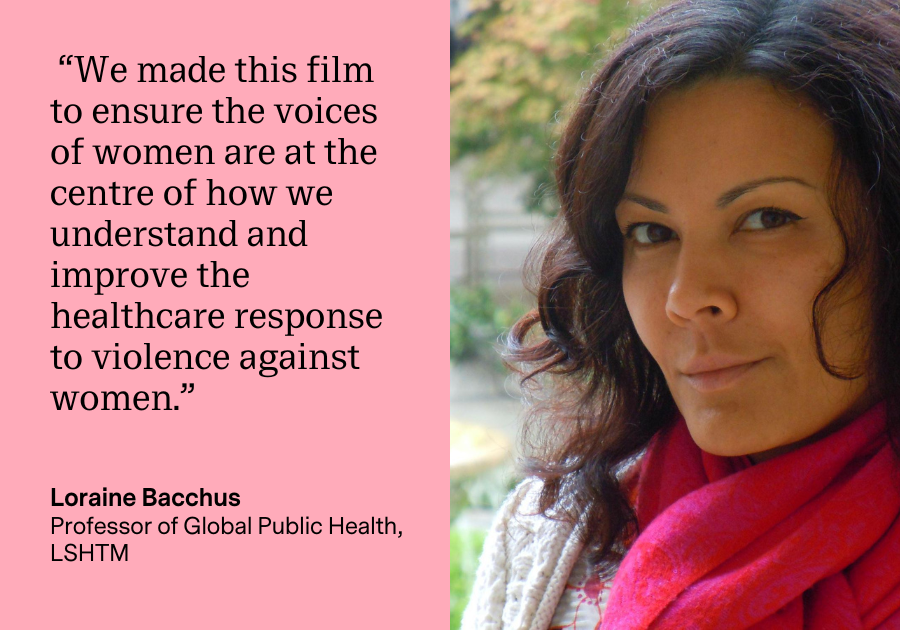New documentary shines light on healthcare responses to violence against women
10 April 2025 London School of Hygiene & Tropical Medicine London School of Hygiene & Tropical Medicine https://lshtm.ac.uk/themes/custom/lshtm/images/lshtm-logo-black.png
Improving healthcare responses to domestic violence through culturally appropriate, women-centred care has the potential to support and protect women at risk, according to the ‘Healthcare Responding to Violence and Abuse’ (HERA) study.
A new documentary exploring findings from the study has been created to amplify women’s voices, shed light on their experiences, and explore how healthcare providers in low-resource settings can better respond to domestic violence.
Violence against women (VAW) is a global violation of human rights. Approximately one in three women worldwide experiencing physical or sexual violence in their lifetime, with the highest prevalence in low- and middle-income countries. Domestic violence, the most common form of VAW, damages women’s health, yet health services in many regions struggle to respond appropriately due to local constraints and structural barriers.
The HERA study aimed to strengthen the health system response to domestic violence against women, and test different interventions, or actions, across four countries: Brazil, Nepal, the occupied Palestinian territories (oPt), and Sri Lanka. These strategies included training and support for healthcare providers to recognise and respond to domestic violence, establishing care pathways for affected women, and improving documentation practices.
The HERA Group, funded by a National Institute for Health and Care Research (NIHR) Global Health Group on Health System Responses to Violence Against Women in low- and middle-income countries, was co-led by the University of Bristol and the London School of Hygiene & Tropical Medicine (LSHTM), in collaboration with the University of Sāo Paulo, An-Najah National University, Kathmandu University and the University of Peradeniya.
A recent paper published in SSM – Health Systems and led by LSHTM, evaluated the impact of the HERA interventions, finding a significant rise in the identification of domestic violence cases by healthcare providers. For example, case identification increased by 100% in Nepal, 78% in Brazil, and 69% in Sri Lanka. In the oPt however, case identification dropped by 24%, reflecting the broader impact of regional violence on healthcare services.
The study noted that healthcare workers reported improved confidence and motivation to address domestic violence, and readiness to inquire and respond through documentation, referrals and ongoing support. However, the evaluation highlighted the importance of socio-cultural, political, and economic contexts, and the necessity of tailoring interventions to specific local contexts such as gender norms and resource limitations.
A powerful new documentary has been created to capture the transformative potential of healthcare systems to support women affected by domestic violence and bring the findings of the HERA study to life through real-world stories.
The film is the result of the collaborative research and engagement with local communities and healthcare professionals in Brazil, the oPt, Nepal and Sri Lanka, documenting not only the challenges faced by women seeking help but also the promising changes taking place within healthcare systems.
The documentary aims to raise awareness among policymakers, practitioners, and the public about the critical role of the health system in identifying and supporting women experiencing violence. It is also intended to foster dialogue, inspire reflection, and influence the training and practices of healthcare professionals globally.
Rushmore Films produced the film, working closely with local filmmakers in each country, researchers, healthcare workers, and women with lived experience of violence to create a film that is both emotionally compelling and policy relevant. It features first-hand accounts and powerful storytelling that highlight the urgent need for survivor-centred, culturally sensitive healthcare responses.
Loraine Bacchus, Professor of Global Public Health at LSHTM and Co-Director of HERA said: “We wanted to make this film to ensure the voices of women are at the centre of how we understand and improve the healthcare response to violence against women. It’s not just a film, but a tool for advocacy, education, and change.”
Gene Feder, Professor of Primary Care at Bristol Medical School, University of Bristol, and Co-Director of HERA said: “Our film weaves together patients who have survived violence with the clinicians and other health care service providers who delivered the HERA programme across the four countries in which they were piloted and evaluated. This vivid tapestry represents the impact of HERA, illuminating our study findings.”
Dr Manuela Colombini, Co-Director of the Gender Violence and Health Centre at LSHTM and co-investigator on the HERA project said: "I hope this film drives action among policymakers, health managers, and healthcare providers to ensure every woman seeking support is met with empathy, compassion, and appropriate care."
The film was funded by the London School of Hygiene & Tropical Medicine’s UKRI GCRF and Newton Fund Consolidation Account and other ODA awards.
If you’d like to learn more about methods for researching and evaluating gender-based violence, the GVHC is running a short course at LSHTM and online this June. Applications close 30 April. Find out more.
Publication
Loraine Bacchus, Stephanie Pereira, Nagham Joudeh et al. A multi-country mixed method evaluation of the HERA (Healthcare Responding to Domestic Violence and Abuse) intervention: A comparative analysis. SSM - Health Systems. https://doi.org/10.1016/j.ssmhs.2024.100042
This news story is based on an original article from the University of Bristol.
If you enjoyed this article and would like to build a career in global health, we offer a range of MSc programmes covering health and data, infectious and tropical diseases, population health, and public health and policy.
Available on campus or online, including flexible study that works around your work and home life, be part of a global community at the UK's no.1 public health university.